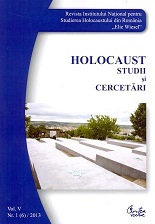Finding Blanka: A Story of Sorrow and Strength in Post-War Romania
Finding Blanka: A Story of Sorrow and Strength in Post-War Romania
Author(s): Julie DawsonSubject(s): History
Published by: Institutul National pentru Studierea Holocaustului din Romania ELIE WIESEL
Keywords: Romanian Holocaust; Bukovina; women’s history; anti-Semitism; communism
Summary/Abstract: In 2009, Julie Dawson discovered the diaries of a woman named Blanka Lebzelter in an abandoned Transylvanian synagogue. In this article, Dawson describes the diaries’ contents and suggests perspectives for approaching the material. Lebzelter was born approximately 1920 in a small town in Bukovina. Like many Bukovina Jews, her family spoke German in the home and identified with Austrian culture. During the war Lebzelter’s father and brother were killed in the pogroms of the summer of 1941; she and her mother were deported to Transnistria. The diaries begin after the war and only rarely reference the horrors suffered. Nevertheless, they are useful tools for understanding the deep trauma experienced by the Holocaust survivors, particularly those who did not “escape” to the West following World War II. Moreover, as detailed and intimate records of everyday life in early communist Romania and of one woman at the brink of modern emancipation, they represent a great resource for social historians of women’s history and communist Eastern Europe.
Journal: Holocaust. Studii şi cercetări
- Issue Year: V/2013
- Issue No: 06
- Page Range: 87-99
- Page Count: 13
- Language: English
- Content File-PDF

